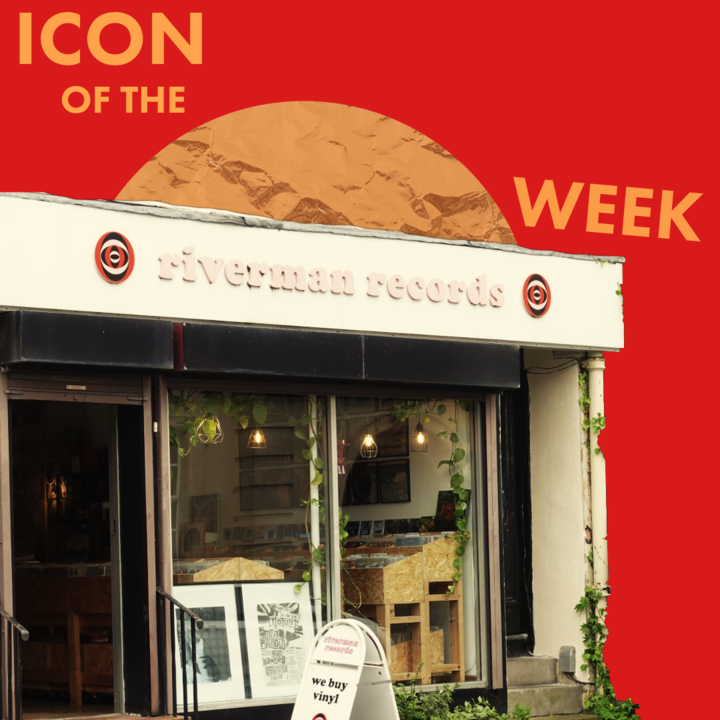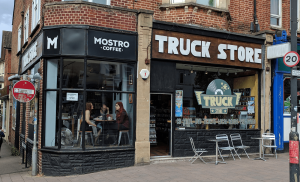Icon of the Week: Riverman Records
by Albert Genower | May 5, 2024

Walking around Oxford can sometimes feel like you’re in a labyrinthian web of cafés, libraries, and bookshops—all the sort of thing you’d expect for a city of its size and demographic. What is conspicuously absent from most of the city, however, are record shops. Unless you count HMV (which I don’t), there are just two record retailers in Oxford: Truck Store on Cowley Road and Riverman Records in Jericho. Whilst Truck Store, covered in an Icon of the Week piece last Michaelmas, focuses mostly on new records, live events, and its cafe, Riverman Records is a far more traditional record store. A crate digger’s paradise, Riverman stocks mostly cheaper, more obscure second-hand records. The shop, which opened in 2019, is run by Cardiff native Andy Tucker, who calls the relative lack of Oxford record shops “remarkable”.
In the late 1970s, or what he affectionately refers to as the “punk years,” Andy ran the independent record label Z Block back in his hometown for a few years. The label didn’t release heaps of material, but it did release a compilation album in 1979 titled Is the War Over?. The record contains a number of Welsh punk and new wave bands, the majority of whom went onto little success (with the exception of Young Marble Giants, a band that Kurt Cobain would call one of his two favourites). One song on the record, Passive by Test to Destruction, is a highly unusual track. A constant, grating bass combines with incredibly strange, kaleidoscopic synth parts and echoed, mumbled spoken word. Many of Z Block’s releases are something of a mystery themselves; internet sleuths haven’t been able to discern much information about the music on the record.
When Z Block folded in 1980, Andy went onto what he called a “proper job”, working in IT for some decades until he was made redundant in 2007. It was not long after that he started his first record shop, a few dozen miles southeast of Oxford, in Henley. The shop there was a little bigger, but when the lease came up in 2019, Andy felt it was time for a change. Moving into an old Threshers in Jericho, he set up his new shop in Oxford: Riverman Records. The shop takes its name from the 1969 Nick Drake song River Man, a haunting folk tune that winds around ambiguously whilst Drake muses about an unidentified character named Betty and the equally mysterious titular River Man. “When I moved,” Andy says, “I was living on a boat, so it just seemed appropriate. I don’t live on a boat anymore, but I did at the time.”
The shop mostly sells records, but there is a smattering of books and cassettes around the shop. “Again, it’s a bit of a niche thing. There are people that come in and buy them. But if I sell half a dozen cassettes in a month, then that’s a good one. I’ve got some books, but I’ve just got no room for them. I’ve got some CDs, but that’s it. In Henley, I had more room, so I did have a lot of books. But when I moved here, there was just not the space for them.” My time in the shop is spent mostly in the extensive jazz section, which takes up the whole right-hand side of the store. Andy had just been delivered a vast collection of Charlie Parker records—I pick up a clearly well-loved copy of Parker and Dizzy Gillespie’s Bird and Diz whilst I’m speaking to Andy. One can imagine the kind of pe rson who brought them in, what kind of bebop aficionado is parting with their prized stack of 1940s jazz.
I ask him if he’s listening to anything new, or anything else he’s particularly into. There isn’t—he just “play[s] stuff that comes in that looks interesting,” like the Parker collection. In a world where so many record shops stock nothing but overpriced factory-sealed records, eclectic collections like these, forged by genuine musical curiosity, are always a treat. He shows me a 1975 record by French outfit Crystal Grass called Crystal World that somebody had just brought in, calling it a “kind of soul thing”. It sounds very Isaac Hayes-esque, with wah-wah guitars and luscious, full-toned strings.
Records aren’t cheap. Nowadays, a new record can set you back anywhere from £20 to £40—hardly pocket change. I ask if the fact he sells lower-priced, second-hand vinyl has helped in a time when dropping that much money on an album (especially when Spotify is readily available) is such a big ask. “Not really. The thing is, there are some records that ten years ago were really cheap. Like Rumours by Fleetwood Mac. That used to be a bargain bin record. But now it’s like £15, £20—because everyone wants to buy it, so why not? It’s not across the board. They’re just specific artists, specific titles. Other records that were bargain bin records ten years ago are still bargain bin records.”
Even if Oxford was a city dense with record shops, you’d be hard-pressed to find one better than Riverman. It’s in the heart of one of the city’s coolest areas and run by an owner with a genuine love of vinyl and encyclopaedic musical knowledge to boot. It’s affordable in a period where record prices often surge to laughable levels, and its actual selection of music is nothing short of fantastic. ‘What’s the point of vinyl?’ is a question so trite that it hardly warrants addressing—but beyond the standard audiophile cries of ‘sound quality’, record shops themselves and the culture they create are indispensable to a city’s musical life—digging, buying, selling, trading, discovering. I don’t know how Oxford managed with just the one record shop, so we all have Riverman to thank for that. It’s just shocking that there’s still only two.∎
Words by Albert Genower. Graphic by Natalie Hytiroglou.




